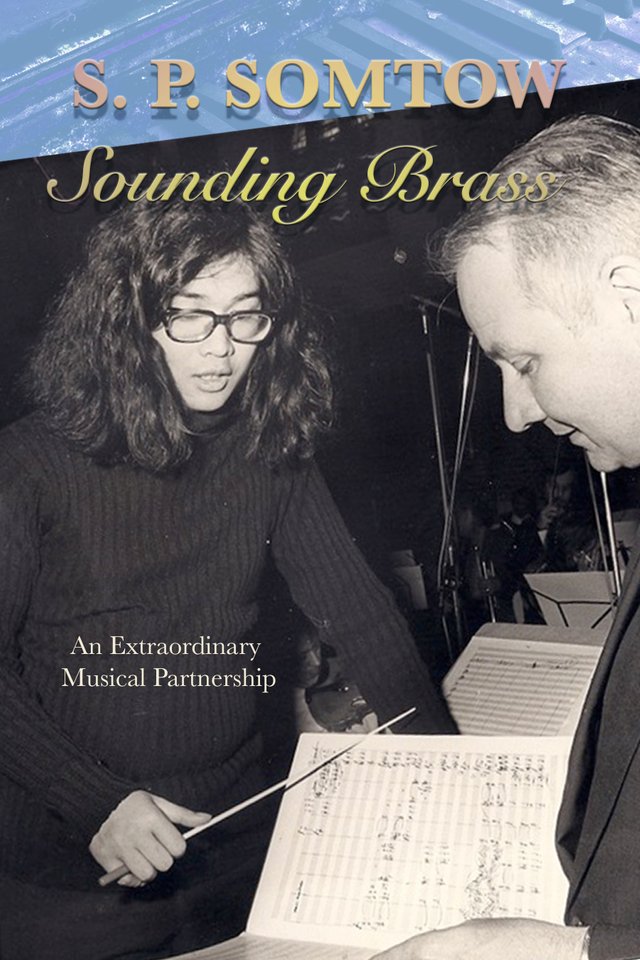Sounding Brass - Memoir of a Curious Musical Partnership - by S.P. Somtow
Chapter One • An Elevator in Farragut Square
Once upon a time, almost half a century ago, I was a college student in an elevator at an exclusive club in Washington, DC. The elevator was filled with important people — admirals and such — and I was trying to look as inconspicuous as possible, considering I was a long-haired Asian attired in quasi-hippie garb. As the elevator descended, they began discussing the Secretary of the Navy, one J. William Middendorf, the Second.
One of the Very Impressive Persons said, “What do you think of Middendorf’s music?”
Another snickered, “Yeah, yeah, his so-called music.”
“I heard a rumor,” said the first, “that it’s all actually composed by some young oriental guy.”
The fly on the wall suddenly became conscious that he was being stared at. Glared at, even. I had the distinct impression that there was some kind of joke being made, that I was somehow the subject of the joke, and that I was missing the punchline.
Now that all this time has passed, it is probably safe for me to confess that I was in fact the “young oriental guy” in question; that I was responsible, in one way or another, for the entire musical oeuvre of J. William Middendorf, II, which consisted of seven symphonies, an opera, numerous tone poems, and over a hundred military marches.
If you were to put the worst possible interpretation of the facts, you might well conclude that this extremely wealthy banker-cum-politician had exploited a young music student, made him churn out reams of music, and passed it off as his own; that I was the compositional equivalent of a prostitute, selling out my talent for a few shekels. You might expound on the tawdry hypocrisy of it all, as J. William Middendorf II gathered ringing endorsements from such luminaries as Yehudi Menuhin and Arthur Fiedler, and waved a baton at the Kennedy Center — on one occasion even dressed as a bear.
If you had interpreted the facts in this way (as did one Washington reporter, who twisted my tale into an even taller one and published a sort of “exposé” in the paper) you would have missed the real story altogether.
It is indeed true that I wrote the actual notes. It’s true that I churned out so many reams of this music, which was so stylistically antithetical to the kind of music I felt I should be writing, that I burned myself out by the age of about twenty-five and had to embark on a completely different career, as a novelist, and as a result, it was twenty years before the muse of music saw fit to reenter my life.
It’s true that this lifetime’s worth of musical output was presented to the public as being by J. William Middendorf, II, with me being relegated to a footnoted credit as “arranger” once in a while.
Yes, things things are true, but they are not the truth.
As always, the truth is a far more complicated animal.
Perhaps I should begin by explaining that this is not Mozart’s Requiem. By this I’m not referring to the popular and entirely unhistorical version of the story found in the movie Amadeus but the real story, which is that the eccentric Count Franz von Walsegg commissioned Mozart to write it. This count was in the habit of paying well known composers to compose works which he would pass off as his own. He paid very well, and numerous composers profited because he used to have quartet evenings on Tuesdays and Thursdays at his house, often featuring new minted quartets under his name.
Count von Walsegg’s wife was only twenty years old when she died, and the count hired the very best to compose the requiem that would be performed under his name in her memory.
Mozart of course died before finishing it, and his wife Constanze really needed the money, so she got Mozart’s pupil Süssmayr to finish the piece (a number of other composers had a hand in it as well.) She was therefore able to collect the second half of the fee.
A lot of romantic twaddle has enveloped this story, ending up with the fictionalized demonization of Salieri, who had nothing to do with any of this and was far too famous a composer to be bothered by a pezzonovante like Wölferl.
However in its essence this is sort of the archetype of such stories. The great, impoverished composer, soon to die, starving in a garret, the wealthy count waving his chequebook. Inevitably, our hero’s tragic death follows, perhaps from consumption or suicide.
Bill Middendorf was no Count von Walsegg. But from my teens and well into my late twenties, he did pay me to produce a body of work, not in my own voice (as Mozart would have done) but in the voice of a average composer of the middle romantic period. He did not write cheques and pass the work off ... it was not that simple. Everything I wrote derived in some way from something in his mind ... a vague humming, a dramatic concept, a pretty picture. We agonized for hours in preparation for the creation of this works, with me banging away at the piano until the wee hours. He was passionate. He yearned in the way that true artists yearn. He was unbelievably generous, not only with money but with gifts of every kind, making it possible for my college years to be spent in great luxury compared to everyone around me, and making it possible for me to work on my own dream projects without starving in a garret — although I did in fact live in the basement of a card-carrying member of the Ku Klux Klan.
In those dozen years, in which I produced, under his name, the entire corpus of work of an imaginary nineteenth-century composer, my patron was an ambassador, a banker, the Secretary of the Navy, a banker again, and Ambassador to the Organization of American States. He played important roles in earth-shaking events such as the Cold War, the Southeast Asian conflict, a major bank takeover, and was one of the people who “knew things” — he warned me of a coup that was about to happen in Thailand which no one in Thailand knew about, for instance, and on our way upstairs to work on one of his marches at the Army and Navy Club in Washington, he stopped to console a distraught Oliver North, wringing his hands in the lobby in the throes of Iran-Contra.
While riding the whirlwind of politics, world affairs, and high finance, Bill Middendorf also had to contend with a wild family life which encompassed, within the same household, the extremes of the most radical 60s liberalism and the most rigid Christian fundamentalism. Constantly keeping a precarious balance between the warring sensibilities of his family was the icing on his political cake.
He found release as an artist. Specifically, as a composer.
Only, he wasn’t actually a composer. He dreamed a composer’s dreams, but had never been able to learn the techniques for making those dreams real. He was good at so many things, but there was this one thing he really wanted to lick. So methodically, using what he always referred to as “my lower middle class intellect”, he set himself the task of trying to lick it, with the help of an Asian boy who had many issues of his own.
No, he did not exploit me. Rather, we exploited each other, both taking great pains to avoid any appearance of exploitation. We did not produce “great music” together, but we certainly made up for that it quantity ... and it was all viable music that played effectively to the gallery and the groundlings. I tried to give the music intellectual content by sneaking in ironies and jokes, and he tried to get me to discover the “big tune” concealed within his humming. It was the union of Mantovani with Schoenberg, and it should have been a marriage made in hell, but somehow, it came off.
I started to write this book because I am afraid that one day someone will take the bones of this story and add to it a different kind of flesh. It could easily be made into a hatchet job, but that would be missing the whole point of it all.
If you delve into it, it becomes something quite profound. It’s a story about the human need to want to break boundaries and exceed limitations. It’s about dreams and aspirations, and in the end we need to ask questions about the very nature of art and about why we as humans need art in our lives.
It is also the story of two people from vastly divergent cultures, two people who both, perhaps, felt alienated from the people and situations that surrounded them, and who came to share a strangely intimate bond.
I loved, and still love, this man as a father figure, a patron, a passionate devotee of the arts, and the person who kept me on my feet during many hard times. I think I’m the only person who can tell this story without grinding any axes.
So let’s begin …
The Hague, the Netherlands, 1970 …
I was at the Church of St. John and St. Philip on a street called Spuyweg, standing around at the post-morning-service kaffeeklatsch, wolfing down cookies and socializing with churchgoers. I was about 17 years old.
I heard a voice, and looked up to see a ruddy-faced man with short, graying hair, a very friendly, direct way of talking. “I’m the American Ambassador,” he said. “I hear you’re a genius, and I want you to teach me the piano.”
If you would like to read the rest of this memoir in installments before it comes out, please go to patreon.com/spsomtow. Only $2 a month brings you this and several other works in installments before anyone else sees them

Congratulations @somtow! You have completed the following achievement on the Steem blockchain and have been rewarded with new badge(s) :
Click on the badge to view your Board of Honor.
If you no longer want to receive notifications, reply to this comment with the word
STOPResteemed, your post will appear in the next curation with a SBD/STEEM share for you!
Your post has been supported and upvoted from the Classical Music community on Steemit as it appears to be of interest to our community.
If you enjoy our support of the #classical-music community, please consider a small upvote to help grow the support account!
You can find details about us below.

The classical music community at #classical-music and Discord.
Follow our community accounts @classical-music and @classical-radio.
Follow our curation trail (classical-radio) at SteemAuto or help us out with a delegation!